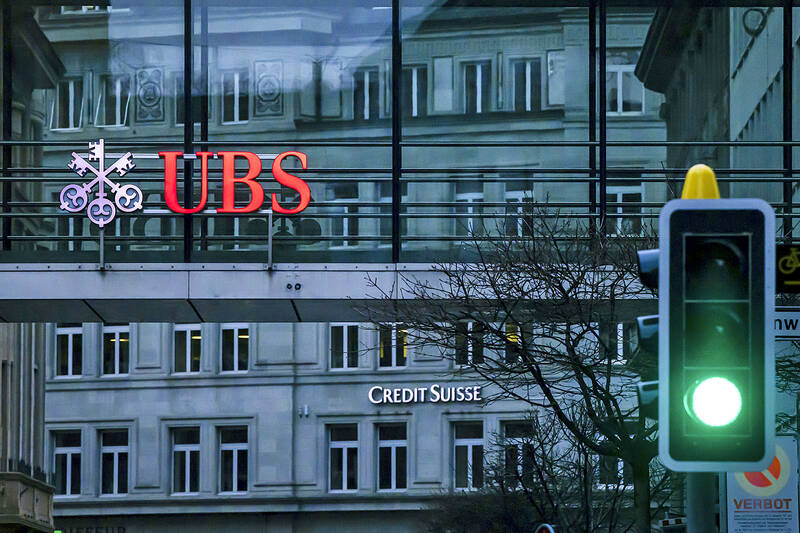UBS Group AG yesterday said that it had finalized the takeover of its former rival Credit Suisse Group AG, clearing the way for a Herculean task of integration that would be closely watched by clients, employees and Swiss political leaders.
The coming months are likely to be “bumpy,” UBS chief executive Sergio Ermotti had said on Friday, saying the government-orchestrated operation would require “waves” of difficult decisions, particularly regarding employment.
“We have finalized the legal takeover of Credit Suisse,” the bank said in an open letter published in the NZZ newspaper, calling it “the beginning of a historic new chapter.”

Photo: AP
UBS, the country’s leading bank, was forced into the marriage to prevent its rival from going under — with potentially catastrophic consequences for the global financial system — but it had not waited for yesterday’s announcement to start preparing to absorb Credit Suisse.
“From Monday onward, UBS can start to be proactive,” Vontobel AG analyst Andreas Venditti said told reporters.
UBS has been preparing since the middle of March and already has an idea of what it wants to keep, close or sell, but had been “limited in what they could do” until the merger was sealed, Venditti said.
The merger of Switzerland’s two biggest banks would be complex technically and politically, resulting in a megabank unlike the Swiss have ever seen — a size that has political leaders worried.
Thousands of jobs could be lost because of overlapping operations.
However, Swiss National Bank Chairman Thomas Jordan said there was no other solution.
“Of course, it’s a pity there is only one [big bank] left. But I am sure that if the takeover by UBS hadn’t succeeded, there would have been an international financial crisis,” he said on Sunday in an interview with the weekly Sonntagszeitung.
Credit Suisse risked collapse when its share prices plunged more than 30 percent during trading on March 15, after three US regional lenders folded. The Swiss government, the central bank and financial regulators stepped in and strong-armed UBS into a US$3.25 billion takeover announced on March 19.
The deal includes guarantees for UBS in case there are any nasty surprises in the Credit Suisse cupboards.
UBS and the Swiss government signed the guarantee contract on Friday, which can reach up to 9 billion Swiss francs (US$9.85 billion), if the losses exceed SF5 billion.
Many questions surrounding the merger remain unanswered, but Venditti said the picture should be clearer after second-quarter financial results emerge.
UBS has pushed the publication date back by more than a month to Aug. 31.
Swissquote Bank analyst Ipek Ozkardeskaya said “talent retention” would be one of the biggest challenges, as staff departures multiply in the face of downsizing fears.
From the political standpoint, the financial regulator FINMA “should make sure to protect competition, which could necessitate an eventual spin-off of certain business units,” she said.

CHIP WAR: Tariffs on Taiwanese chips would prompt companies to move their factories, but not necessarily to the US, unleashing a ‘global cross-sector tariff war’ US President Donald Trump would “shoot himself in the foot” if he follows through on his recent pledge to impose higher tariffs on Taiwanese and other foreign semiconductors entering the US, analysts said. Trump’s plans to raise tariffs on chips manufactured in Taiwan to as high as 100 percent would backfire, macroeconomist Henry Wu (吳嘉隆) said. He would “shoot himself in the foot,” Wu said on Saturday, as such economic measures would lead Taiwanese chip suppliers to pass on additional costs to their US clients and consumers, and ultimately cause another wave of inflation. Trump has claimed that Taiwan took up to

A start-up in Mexico is trying to help get a handle on one coastal city’s plastic waste problem by converting it into gasoline, diesel and other fuels. With less than 10 percent of the world’s plastics being recycled, Petgas’ idea is that rather than letting discarded plastic become waste, it can become productive again as fuel. Petgas developed a machine in the port city of Boca del Rio that uses pyrolysis, a thermodynamic process that heats plastics in the absence of oxygen, breaking it down to produce gasoline, diesel, kerosene, paraffin and coke. Petgas chief technology officer Carlos Parraguirre Diaz said that in

SUPPORT: The government said it would help firms deal with supply disruptions, after Trump signed orders imposing tariffs of 25 percent on imports from Canada and Mexico The government pledged to help companies with operations in Mexico, such as iPhone assembler Hon Hai Precision Industry Co (鴻海精密), also known as Foxconn Technology Group (富士康科技集團), shift production lines and investment if needed to deal with higher US tariffs. The Ministry of Economic Affairs yesterday announced measures to help local firms cope with the US tariff increases on Canada, Mexico, China and other potential areas. The ministry said that it would establish an investment and trade service center in the US to help Taiwanese firms assess the investment environment in different US states, plan supply chain relocation strategies and

WASHINGTON POLICY: Tariffs of 10 percent or more and other new costs are tipped to hit shipments of small parcels, cutting export growth by 1.3 percentage points The decision by US President Donald Trump to ban Chinese companies from using a US tariff loophole would hit tens of billions of dollars of trade and reduce China’s economic growth this year, according to new estimates by economists at Nomura Holdings Inc. According to Nomura’s estimates, last year companies such as Shein (希音) and PDD Holdings Inc’s (拼多多控股) Temu shipped US$46 billion of small parcels to the US to take advantage of the rule that allows items with a declared value under US$800 to enter the US tariff-free. Tariffs of 10 percent or more and other new costs would slash such